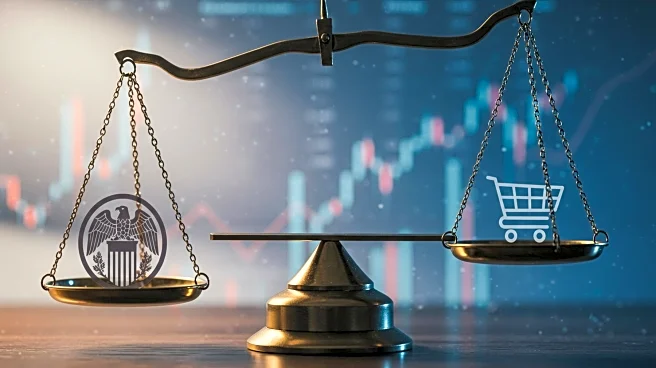What's Happening?
U.S. stocks opened lower as investors reacted to Walmart's earnings report and comments from Kansas City Federal Reserve President Jeffrey Schmid. Walmart reported a rare miss on adjusted earnings per share, despite topping revenue forecasts and raising its full-year outlook. This marks the first time since May 2022 that Walmart's earnings per share fell short. The retailer cited rising costs from tariffs but noted increased shopping from wealthier consumers. Meanwhile, Schmid expressed doubts about lowering interest rates in September due to persistent inflation, which has led to a decrease in market expectations for a rate cut. Investors are also anticipating Federal Reserve Chair Jerome Powell's upcoming speech at the Jackson Hole Economic Symposium, hoping for insights into future monetary policy decisions.
Why It's Important?
The developments surrounding Walmart and the Federal Reserve are significant as they reflect broader economic challenges. Walmart's earnings miss, despite strong revenue, highlights the impact of tariffs and changing consumer behavior, which are critical factors in assessing the health of the retail sector and consumer spending. The Federal Reserve's stance on interest rates is crucial for economic stakeholders, as rate cuts can stimulate economic activity but may also exacerbate inflation concerns. The mixed signals from the Fed and the retail sector underscore the complexity of navigating economic policy amid inflationary pressures and labor market uncertainties. These factors collectively influence investor sentiment and market dynamics, affecting businesses and consumers alike.
What's Next?
Investors are closely monitoring Powell's speech at the Jackson Hole Economic Symposium for potential signals on future interest rate policies. The Federal Reserve's decision-making will be pivotal in addressing inflation and labor market concerns. Additionally, Walmart's performance and its response to tariff pressures will be watched as indicators of consumer spending trends. The evolving economic landscape may prompt businesses to adjust strategies in response to monetary policy shifts and consumer behavior. Stakeholders across industries will need to adapt to these developments to mitigate risks and capitalize on opportunities.









